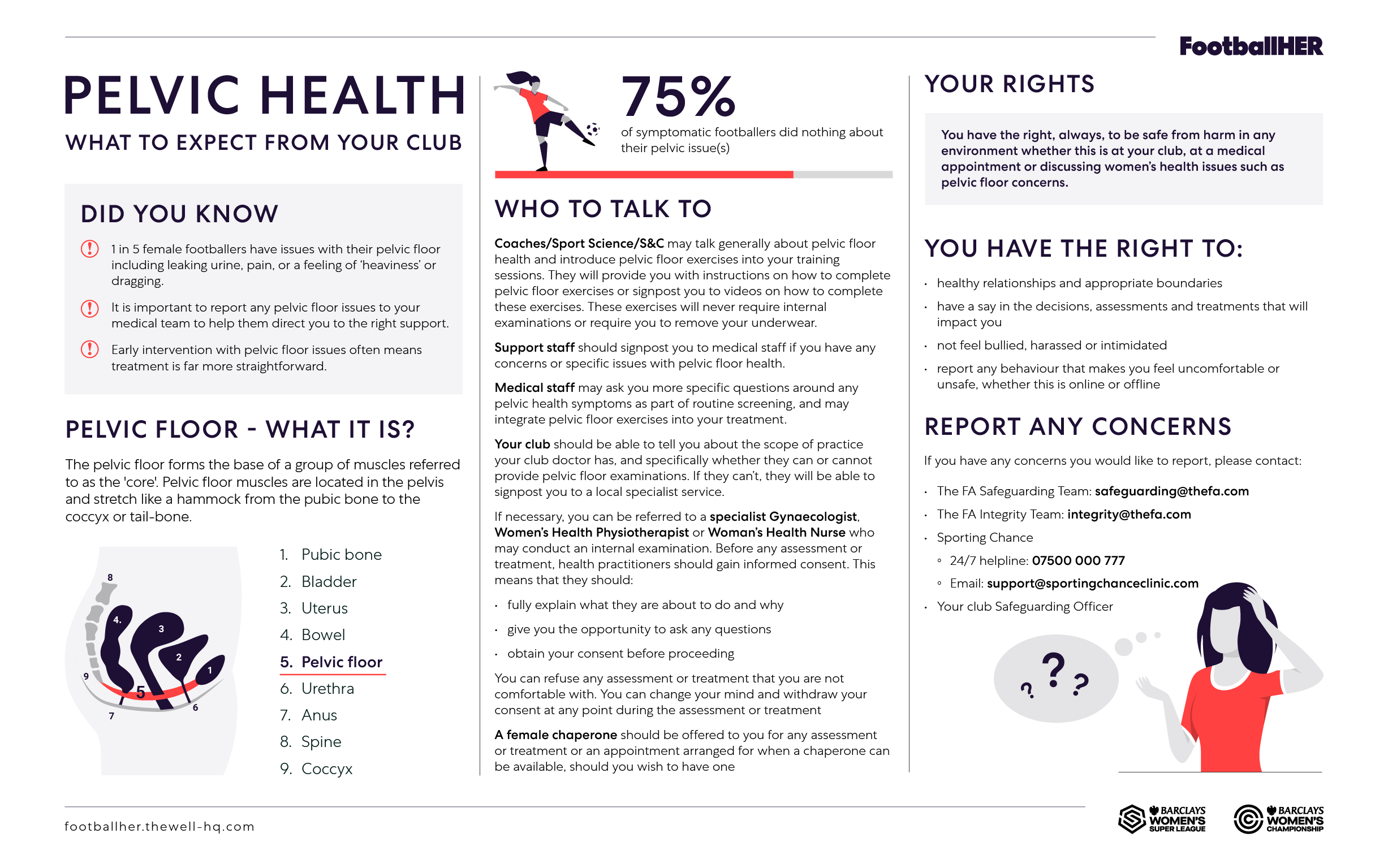Clubs supporting female athlete health
Your club recognises the importance of Female Athlete Health and have been offered training to learn more about how they can support all aspects of women’s health, including pelvic health.
They will be looking at how they can create safe and supportive environments with you, to help normalise conversations about Women’s Health.
Clubs will maintain good working relations with parents / carers of Players under the age of 18. Clubs will ensure relevant and appropriate information is shared about programmes and initiatives related to Female Athlete Health so parents / carers can support as required..
Pelvic Health
Reporting and treating Pelvic Floor issues at your Club.
Good pelvic health is essential for your physical and mental wellbeing. 1 in 5 female footballers have issues with their pelvic floor including leaking urine, pain, or a feeling of ‘heaviness’ or dragging. It is important to report any pelvic floor issues to your medical team to help them direct you to the right support. Early intervention with pelvic floor issues often means treatment is far more straightforward.
Why might I need to see a specialist?
Many women can improve their pelvic health by following some basic advice from your club medical staff, but others may need to be seen by a specialist doctor (Gynaecologist), a women’s health physiotherapist or a women’s health nurse. When seeing a specialist for pelvic health, they may need to examine your pelvic floor. The specialist will always ask you for permission, and you have the right to say no or to think about it and come back at a later date. In some situations, this may mean they cannot diagnose and treat your problem to their best ability, and they will discuss that with you.
Who can offer to give me a pelvic health exam?
- Gynaecologists
- GP
- Women’s Health Nurse
- Women’s Health Physiotherapist – we advise that you use a physiotherapist who is a member of the Pelvic Obstetric and Gynaecological Physiotherapy group.
Your club Doctor will be able to advise if they can offer this. If not, or if you would prefer not to have this done by your club Doctor, they will signpost you to the above.
Consent
Before any assessment or treatment, the health practitioner should gain informed consent. This means that they should:
- fully explain what they are about to do and why
- give you the opportunity to ask any questions
- obtain your consent before proceeding
You can refuse any assessment or treatment that you are not comfortable with.
You can change your mind and withdraw your consent at any point during the assessment or treatment.
A female chaperone should be offered to you for any assessment or treatment, or an appointment rearranged for when a chaperone can be available, should you wish to have one.
What is a pelvic exam and what to expect?
After obtaining your informed consent, a pelvic health specialist will look at the external genital area for signs of infection, age-related changes and prolapse. You may be asked to try to contract the pelvic floor muscles, so they can see what happens from the outside in the vulva and your abdomen when you do this.
An internal vaginal examination may be performed. The specialist will use one or two gloved fingers to check the pelvic floor muscles internally. They can also check for prolapse and any tender or tight areas internally. They will ask you to contract and relax the muscles several times. This will usually be done lying down, but sometimes you may be asked to check these muscles while you stand or sit.
A rectal examination may be performed instead of a vaginal examination if your main problem relates to bowel incontinence or a large tear resulting from childbirth. The specialist will use one gloved finger to assess the pelvic floor muscles in the rectum. They will ask you to contract and relax the muscles several times.
Sometimes a specialist may check other things like your posture in standing and sitting, and the way you move. They may check your pelvic floor muscles using real time ultrasound which uses a probe placed over your low abdomen, or over the outside of your perineum (between the vagina and anus) to check the pelvic floor muscles.

